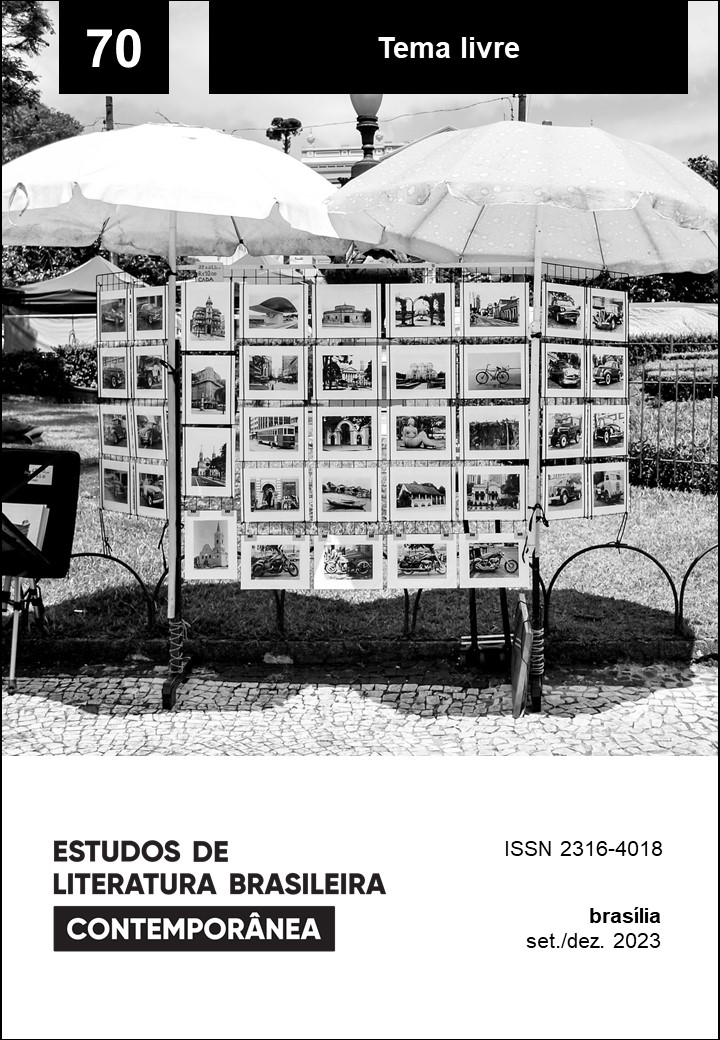Marked by resistance: the cases of Jinkings (PA) and Palmarinca (RS) bookstores
DOI:
https://doi.org/10.1590/2316-40187005Keywords:
bookstore; literary system; literary field; Jinkings; PalmarincaAbstract
The purpose of this article was to analyze the role of two bookstores that operated during the Brazilian military dictatorship (1964-1985) and became points of resistance against the authoritarian regime. Jinkins was created by Raimundo Jinkings, in Belém, Pará, in 1965, and closed 45 years later. The bookseller was already an active unionist and known in the political scene for his leftist stance, and he transferred this symbolic capital to the bookstore. In Porto Alegre, Rio Grande do Sul, Rui Gonçalves opened Palmarinca, which operated from 1972 to 2020. The bookstore marked the history of the city as a space where readers could find Marxist works unavailable in other stores in the region. It was frequented by students, professors, and politicians who shared the same political convictions. The study showed how each bookstore used a “repertoire” — a concept of Itamar Even-Zohar — to maintain the commerce of books without damaging its political identification, in addition to serving as an active factor of opposition against the military regime.
Downloads
References
ARQUIVO NACIONAL (1980a). BR_DFANBSB_V8_MIC_GNC_GGG_80001552_d0001de0001. Disponível em: https://sian.an.gov.br/ Acesso em: 10 out. 2019.
ARQUIVO NACIONAL (1980b). BR_DFANBSB_V8_MIC_GNC_GGG_80001793_d0001de0001. Disponível em: https://sian.an.gov.br/ Acesso em: 10 out. 2019.
ARQUIVO NACIONAL (1981). BR_DFANBSB_V8_MIC_GNC_KKK_85005430_d0001de0003. Disponível em: https://sian.an.gov.br/ Acesso em: 13 mar. 2021.
ARQUIVO NACIONAL (1983). BR_DFANBSB_V8_MIC_GNC_GGG_83007614_d0001de0001. Disponível em: https://sian.an.gov.br/ Acesso em: 18 fev. 2022.
BERAS, Cesar (2018). Palmarinca: livros, sentimentos, capitalismo e resistência. Porto Alegre: Evangraf.
BOURDIEU, Pierre (2002). As regras da arte: gênese e estrutura do campo literário. São Paulo: Companhia das Letras.
BRASIL, Jocelyn (1995). Entre as letras e as baionetas. Rio de Janeiro: Jotanesi.
CAMPOS, Arnaldo (2006). Um livreiro de todas as letras: Arnaldo Campos em entrevista a Renato Mendonça. Florianópolis: Escritório do Livro; Santa Cruz do Sul: Edunisc.
CARNEIRO, Maria Luiza Tucci (2002). Livros proibidos, ideias malditas: o DEOPS e as minorias silenciadas. São Paulo: Ateliê Editorial/ PROIN Fapesp.
EVEN-ZOHAR, Itamar (1990). Introduction [to Polysystem Studies] e Polysystem Theory. Polysystem Studies. Poetics Today, v. 11, n. 1, p. 9-26.
EVEN-ZOHAR, Itamar (2013). O sistema literário. Revista Translatio, n. 5, p. 22-45. Disponível em: https://seer.ufrgs.br/index.php/translatio/article/view/42900 Acesso em: 27 jan. 2020.
» https://seer.ufrgs.br/index.php/translatio/article/view/42900
EVEN-ZOHAR, Itamar (2021). O trabalho ideacional e a produção de energia social: intelectuais, elaboradores de ideias e empreendedores culturais. Florianópolis: Rafael Copetti.
HALLEWELL, Laurence (2005). O livro no Brasil. São Paulo: Edusp.
JORNAL DO BRASIL (1979). p. 20. Disponível em: http://memoria.bn.br/DocReader/DocReader.aspx?bib=030015_09&pesq=%22Livraria%20Jinkings%22&pasta=ano%20197&pagfis=208856. Acesso em: 11 ago. 2021.
KAHLMEYER-MERTENS, Roberto S. (org.) (2010). Conversações com intelectuais fluminenses. Niterói: Nitpress.
KUNG FU LOUNGE (2007). Camuflagem. Raimundo Jinkings. Disponível em: http://raimundojinkings.blogspot.com/2007/11/camuflagem.html Acesso em: 11 ago. 2021.
» http://raimundojinkings.blogspot.com/2007/11/camuflagem.html
MACHADO, Ubiratan (2008). Pequeno guia histórico das livrarias brasileiras. São Paulo: Ateliê.
MAROZO, Luís Fernando da Rosa (2018). A contribuição de Even-Zohar para a abordagem da literatura. Ipotesi, Juiz de Fora, v. 22, n. 2, p. 9-19.
MOLLO, Lúcia Tormin (2022). Livrarias e livreiros na Ditadura Militar brasileira (1964-1985). Tese (Doutorado) – Universidade de Brasília, Brasília.
OLIVEIRA, Alfredo (2010). Cabanos e camaradas. Belém: Edição do Autor.
PARTIDO COMUNISTA BRASILEIRO (PCB) (2021). PCB homenageia Raimundo Jinkings. PCB. Disponível em: https://pcb.org.br/portal2/3111/pcb-homenageia-raimundo-jinkings-2/ Acesso em: 11 ago. 2021.
» https://pcb.org.br/portal2/3111/pcb-homenageia-raimundo-jinkings-2/
PINTO JÚNIOR, Antonio Carlos Pimentel (2011). A biblioteca vermelha de Raimundo Jinkings: uma história de livros. Dissertação (Mestrado) – Universidade Federal do Pará, Belém.
REIMÃO, Sandra (2014). Proíbo a publicação e circulação... Censura a livros na ditadura militar. Estudos Avançados, v. 28, n. 80, p. 75-90. https://doi.org/10.1590/S0103-40142014000100008
» https://doi.org/10.1590/S0103-40142014000100008
SEMEADOR DE SONHOS (1994). Direção: Val Sampaio. Disponível em: https://www.youtube.com/watch?v=4nRjmlvcw_w&t=1s. Acesso em: 11 ago. 2021.
» https://www.youtube.com/watch?v=4nRjmlvcw_w&t=1s
TUPIASSÚ, Amarílis (2018). Raimundo Jinkings: coragem e persistência de um livreiro. Blog da Boitempo. Disponível em: https://blogdaboitempo.com.br/2018/09/21/raimundo-jinkings-coragem-e-persistencia-de-um-livreiro Acesso em: 11 maio 2022.
» https://blogdaboitempo.com.br/2018/09/21/raimundo-jinkings-coragem-e-persistencia-de-um-livreiro
VILLARINO PARDO, Maria Carmen (2000). Aproximação à obra de Nélida Piñon: a república dos sonhos. Tese (Doutorado) – Universidade de Santiago de Compostela, Santiago de Compostela.
Downloads
Published
How to Cite
Issue
Section
License

This work is licensed under a Creative Commons Attribution-NoDerivatives 4.0 International License.
Authors who publish in this journal agree to the following terms:
a) The authors maintain the copyright and grant the journal the right of first publication, the work being simultaneously licensed under the Creative Commons Attribution License-Non Commercial 4.0 which allows the sharing of the work with acknowledgment of the authorship of the work and publication this journal.
b) Authors are authorized to enter into additional contracts separately, for non-exclusive distribution of the version of the work published in this journal (eg publish in institutional repository or as a book chapter), with authorship recognition and publication in this journal.
c) Authors are allowed and encouraged to publish and distribute their work online (eg in institutional repositories or on their personal page) after the editorial process, as this can generate productive changes, as well as increase the impact and citation of published work (See The Effect of Free Access).
d) The authors of the approved works authorize the magazine to, after publication, transfer its content for reproduction in content crawlers, virtual libraries and the like.
e) The authors assume that the texts submitted to the publication are of their original creation, being fully responsible for their content in the event of possible opposition by third parties.


